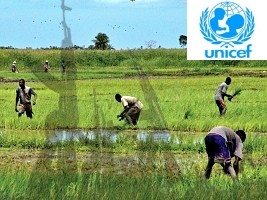|
||||||||||||||||||
|
|
Haiti - Insecurity : Gang violence intensifies in Artibonite, the country's rice granary 05/10/2023 10:12:42
The latest available figures show that between May and June 2023, at least 60 people were killed or injured in clashes over territory and resources between armed groups, compared to four during the same period last year. Nearly half of the 298 kidnappings across the country during this period took place in Lower Artibonite, or the Lower Artibonite, mainly involving civilians traveling on public transportation. In one incident, 15 women heading to the market were reportedly kidnapped and raped. More than 100 schools have closed their doors due to insecurity and only one in four health facilities in the entire department remain accessible due to security concerns. Around a third of the population, almost half of whom are children, are now in need of humanitarian assistance. Brutal violence, like that observed in Port-au-Prince, has forced the displacement of families and disrupted rice and agricultural production, vital to the economy. More than 22,000 people were displaced in June, compared to fewer than 10,000 in April. Most have sought refuge in host communities, while hundreds are taking refuge in precarious makeshift spaces, with little access to basic services or protection from armed groups. "No human being, let alone any child, should ever have to face such shocking brutality, deprivation and lawlessness. The current situation is simply untenable," said UNICEF Executive Director Catherine Russell. “The humanitarian system, including UNICEF, is providing and scaling up the response, but we need the support of the international community to reach Haitian children and families who desperately need help at this time," said Russell, who is also the designated lead attorney. for Haiti for the Inter-Agency Standing Committee (a group of humanitarians). Haiti was among the top five countries in the world in terms of cholera cases recorded between July 20 and August 31, and Artibonite was the hardest hit overall. Aid workers say insecurity has made access extremely difficult, if not impossible, to six of the department's 17 communes, including Saint Marc, Verrettes and Petite Rivière – cholera hotbeds where some families are virtually besieged by violence. Two of the three main water treatment plants in Artibonite have closed due to insecurity, and the third is facing distribution problems. The spread of violence from Port-au-Prince to Artibonite exacerbates an already critical humanitarian emergency. More than 5 million people, including a record 3 million children, will need humanitarian assistance in 2023. Nearly five million people are cruelly hungry. Haiti was already the poorest and least developed country in the Western Hemisphere long before the current crisis. In collaboration with its partners, UNICEF has helped more than 150,000 people in Artibonite, notably through a vaccination campaign against cholera, and provided 350,000 people with drinking water, chlorine tablets and kits. hygiene, and rehabilitated damaged water sources. More than 32,100 children have been screened for malnutrition this year, of whom more than 3,400 have received ready-to-use therapeutic foods, essential for their survival, which UNICEF is purchasing for the entire country. Dozens of health workers have been deployed to support the struggling health system; 100 health facilities equipped with cold chain equipment and 40 nursery units equipped with solar kits. Schools and students in areas affected by violence have received more than 13,600 kits; and hundreds of the most vulnerable families receive cash assistance to help them continue their education. Funding remains a critical constraint. The UN's $720 million Humanitarian Response Plan for 2023 is just over a quarter funded and UNICEF has received only 20% of its $246 million appeal for 2023. HL/ HaitiLibre
|
|
|
Why HaitiLibre ? |
Contact us |
Français
Copyright © 2010 - 2024 Haitilibre.com |



